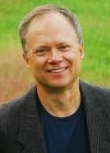 Joel Salatin, proprietor of Polyface Farms and highly-visible champion of sustainable farming, thinks modern humans have become so far removed from a natural connection to the food they eat, that we no longer have a true understanding of what “normal” food is.
Joel Salatin, proprietor of Polyface Farms and highly-visible champion of sustainable farming, thinks modern humans have become so far removed from a natural connection to the food they eat, that we no longer have a true understanding of what “normal” food is.
The rise of Big Ag and factory farming over the past century has conditioned us to treat food mechanically (as something to be recoded and retooled) vs biologically. And we don’t realize that for all our industrialization and optimization, we’re actually getting less yield and less nutrition than natural-based processes can offer.
Whether we like it or not, the arrival of peak oil is going to force us to realize that our heavily-energy intensive practices can’t continue at their current scale. And with world population still increasing exponentially, we’ll need to find other, more sustainable, ways of growing our food.
“What we view today as “normal” I argue is simply not normal. Just think about if you wanted to go to town 120 years ago. If you wanted to go to town you actually had to go out and hook up a horse. That horse had to eat something, which means you had to have a patch of grass somewhere to feed that horse which meant you had to take care of some perennial in order to feed that horse in order to go to town. And so throughout history, you had these kinds of what I call ‘inherent boundaries’ or brakes on how much a single human could abuse the ecology.
And today, during this period of cheap energy, we’ve been able to extricate ourselves from that entire umbilical, if you will, and just run willy-nilly as if there is no constraint or restraint. And now we are starting to see some of the outcome of that boundless, untied progression. And so the chances are, the way to bet, is that in the future we are going to see more food localization, we are going to see more energy localization, we are going to see more personal responsibility in ecological lifestyle decisions because it’s going to be forced on us to survive economically. We are going to have to start taking some accounting of these ecological principles.”
Joel, his family, and the team at Polyface Farms dedicate themselves to developing environmentally, emotionally and economically-enhanced food prototypes and advocate for duplicating their production around the world.
In this interview, Chris and Joel explore what constitutes truly sustainable agriculture and the reasons why our current system has departed so far from it, as well as practical steps individuals can take to increase their own personal resiliency around the food they eat (in short: “find your kitchen”, source your food locally, and grow some yourself).






